
SeMPER-Arctic News
We are happy to announce that the project has been extended till 31 October 2024, due to challenges imposed by Covid-19. It was accepted by all the funders and the Belmont Secretariat.
Making knowledge inclusive? Improving how we do research with Indigenous and local communities
March 2024
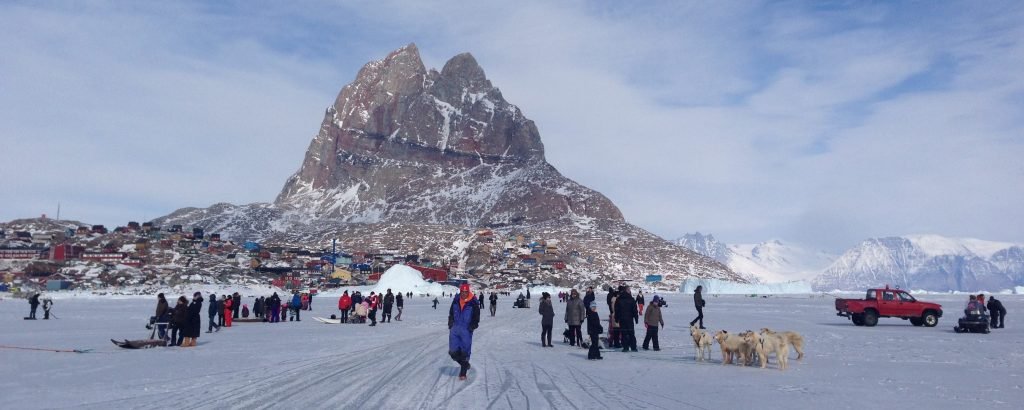
More and more global challenges like climate change are being felt locally, and Indigenous peoples are often the most vulnerable. Scientists who work on methods to adapt to climate change often want to include Indigenous and local people in their research, but this can be a challenge for a multitude of reasons. Utrecht University researcher Roxana Roos set out to uncover the most important barriers to the participation of local and Indigenous communities. She just published her results: “There is much room for improvement when it comes to involving local knowledge and perspectives.”
The inclusion of the perspectives of Indigenous and local people when developing ways to respond to societal challenges is increasingly the norm in the scientific world. “For response strategies to be effective, communities need to be involved in their development,” explains Roos, a senior researcher at the Copernicus Institute of Sustainable Development and the University of Bergen. This is true for a whole range of topics, from social justice to climate adaptation. But getting local communities involved in research by ‘outsiders’ can be difficult. For her research published in Humanities and Social Sciences Communications, Roos interviewed several researchers who work with local communities, in different fields of research around the globe, about the challenges they face. “I discovered that, while these researchers work on completely different topics and in different continents, they often run into the same issues.”
Diverse challenges
Roos divided these issues into eight categories. “Time and money can be a limiting factor for researchers, who often don’t have the opportunity to foster a relation of mutual trust with locals as a result.” Additionally, local communities often don’t see the relevance of the research to their daily lives and may have negative past experiences with scientists. “Some Indigenous peoples have seen foreign researchers come to their community, ask questions, collect data and leave, giving nothing back to the community while earning a salary for it.” Furthermore, communities may wish to be paid for their participation, which can lead to funding issues.
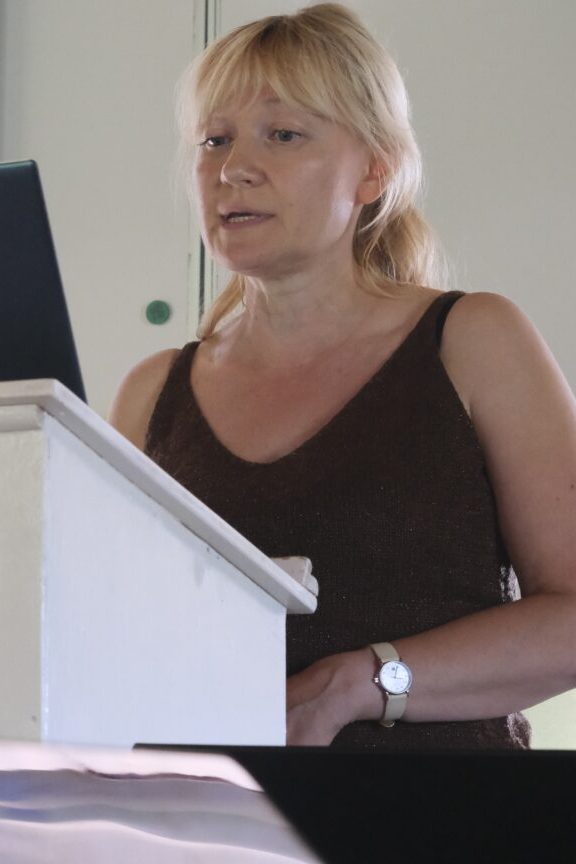
Some Indigenous peoples have seen foreign researchers come to their community, ask questions, collect data and leave, giving nothing back to the community while earning a salary for it.
Roxana Roos, Senior Researcher,
Copernicus Institute of Sustainable Development
Photo: Eva H. Murvold
Cultural differences can also be an important barrier. Roos: “In some cultures, researchers may only be able to speak to community members of a specific gender, or local elders.” Language barriers also play a role. “Researchers are often dependent on interpreters, disrupting the flow of conversation.” Finally, indigenous knowledge and perspectives are often not accepted by the Western scientific establishment. “Indigenous theories and methods and work by indigenous researchers should not be dismissed,” says Roos.
Dealing with challenges as part of the scientific method
Analysis of scientific papers written by the researchers Roos spoke to showed that they hardly write about the challenges they face. This results in neither local participants nor other readers of these texts being able to critically reflect about the challenges arising during research and the strategies used to deal with them. Roos recommends that researchers start discussing the challenges they face in their articles. “Recognizing and dealing with these challenges is part of the scientific process. This way, researchers can learn from each other’s experiences and advance science together”.
Based on the experiences of her interviewees, Roos also gives suggestions on how to deal with the eight specific challenges. These are characterized by an overarching theme: “What’s most important is to involve local people from the start, letting them have an equal say and properly valuing their knowledge and perspectives as valuable to science.”
(Article originally published by Utrecht University, written by Charlotte Ballard)
The full paper, R. Roos (2024) “Maybe you need to do something about it”: challenges in global environmental change research with and within local communities. Humanities and Social Sciences Communications 11:429 is available here: https://doi.org/10.1057/s41599-024-02942-5
Reinventing responsibility in research
November 2023
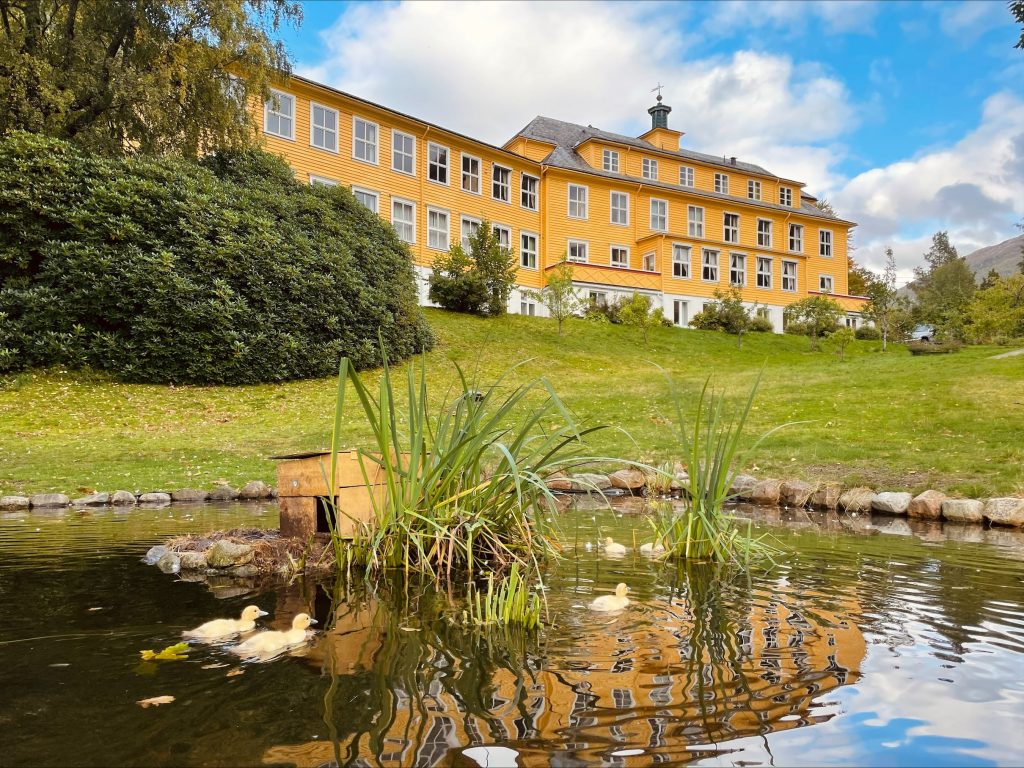
In September 2023, SeMPER-Arctic member Anne Blanchard organised a PhD autumn school (as part of the AFINO network) on the theme of reinventing responsible research. Several members of SeMPER-Arctic participated, including Natalia Doloisio, Tanguy Sandré and Jean-Paul Vanderlinden (as part of the lecturing team). This gave us the occasion to creatively explore care and responsibility in research, with attention to everyone’s particular research context and topic. Four important aspects of responsible research were discussed:
- Anticipation should be grounded in a discussion of what kind of futures we want or deem desirable, but it should also be balanced with and anchored in a focus on the present (and the type of reflections, discussions and actions we can have and implement right now)
- Responsiveness is about “adjusting courses of action while recognising the insufficiency of knowledge and control” (Stilgoe et al, 2013); in that sense it is important to keep in mind that “a response is both an action and an answer”, bearing consequences.
- Reflexivity allows us to think about the more profound meaning of one’s research endeavour, so that we don’t get entirely swallowed by the strict injunctions for fast, excellent and productive research. In particular, it allows us to keep in mind our intentions for freedom, justice, plurality, or again emancipation.
- Inclusion and participation was seen as a key aspect of responsible and caring research, as it demands an awareness of the forgotten voices, the less powerful voices, and reflections on how to undertake inclusive research in a meaningful, respectful and caring way.
All of these reflected the experiences and discussions that we have within the SeMPER-Arctic consortium, on what caring narrative research in an Arctic context, might entail.
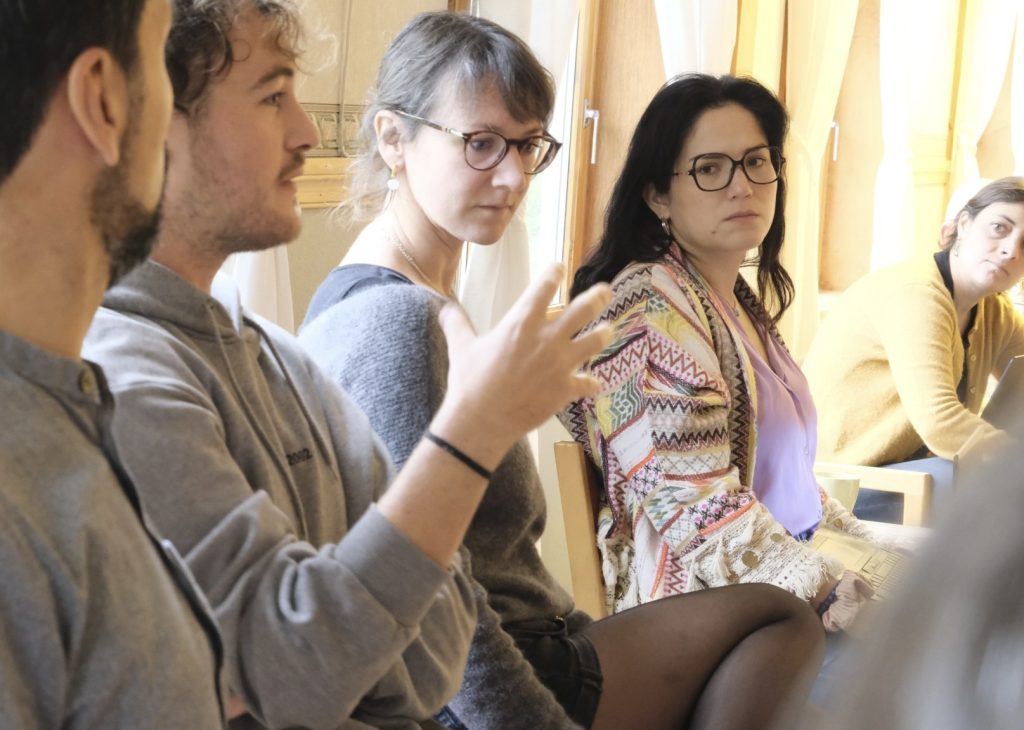
Inuuniddinni Ilaaralaaor Documentary
October 2023
Since 2021, a French research team has been visiting Ittoqqortoormiit as part of a research project to understand what it means to live here in Ittoqqortoormiit. Many of the stories told highlighted the importance of the narwhal. The year 2021, when only two narwhals were caught, came up again and again. As did the introduction of quotas since 2004 and the tensions surrounding their setting, while environmental restrictions on hunting are decided with little regard for local specificities and knowledge. These stories seem important to us, and we wanted to reiterate them. The aim of this documentary is to show how the involvement of community members can lead to a fairer situation. Inuuniddinni Ilaaralaaor (2023) is part of the SeMPER-Arctic and PREFER projects.
Inuuniddinni Ilaaralaaor from CEARC Research Centre on Vimeo.
Arctic narrative research as care: Presentation at the Nordic STS conference, Oslo, 7-9th June 2023
October 2023, Anne Bremer
In June 2023, I attended the Nordic STS conference in Oslo, where I presented my insights into rethinking Arctic narrative research as care, based on an early reading of the interviews I have undertaken with several SeMPER-Arctic members in the first half of the year.
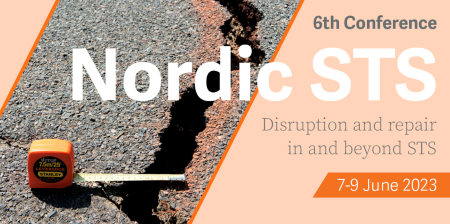
I started by presenting the framings of narrative research as care that were expressed in the interviews; namely:
- Care as a “slow, compassionate and respectful attention to neglected narratives”
- Care as empowerment, “giving a voice to those who are oppressed, marginalised, dominated”
- Care as a “duty to reduce suffering and loss when people express it”
- Care as a way to “guard against and mitigate impacts of risks”, and to “ensure that humanity reaches its full potential”
I then expanded on those framings, to explore how care in narrative research actually encourages reflections about 'translation' (and in particular our limited capacity to grasp, through narratives, complex and multifaceted experiences), 'non-attachment' (specifically our awareness of ideals of control and attachement to natural and social environments that are in constant flux) and 'present-anchoring' (as a way of balancing an overwhelming focus on the future, to think about what we can do now, with our limited knowledge and resources).
Belmont SeMPER-Arctic consortium meeting in Copenhagen, Denmark
December 2022, Anna Karlsdóttir
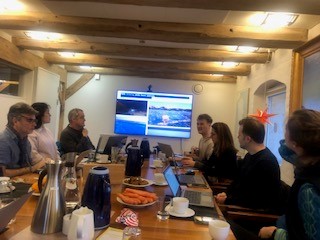
In December, Semper-Arctic project partners met in Nordatlantens brygge and the Icelandic cultural house/Jónshús in Copenhagen. The project has now officially been granted an extension to catch up with the delay of activities caused by covid-19 pandemic. We were 12 participants which turned out to be a good size for good discussions on the basis of our project activities.
Besides our internal project presentations with each of us presenting the recent work we have been doing in the project, we also had Minik Rosing (geology), Jacob Taarup (catastrophe emergency response and command) and Heidi Andreasen (Biology) providing different expert input on hazard planning, citizen science and the role of how Greenland can contribute to sustainable global development. One aim is to identify narratives as a source of resilience in Greenlandic communities (mainly Uummannaq and Ittoqqortoormiit) compared with narratives driven by natural science perspective and policy discourse.
Nordatlantens Brygge is a cultural center in Copenhagen's old harbor area hosting the Icelandic Embassy, the Faroese Representation, Vest Nordic Tourism Council and The Greenland Representation, which offered us facilities to meet. The place is also called Grønlands Handels Plads and used to be the storehouse for goods brought from the West Nordic colonies. The cultural center is run in collaboration between Iceland, Greenland and the Faroe Islands. Jónshús is owned by the Icelandic parliament and has a library, and meeting facilities with a couple of guest researcher apartments. The house was the home of the independence icon and Natural Science researcher Jón Sigurðsson.
SeMPER-Arctic project at the Arctic circle conference in Reykjavík, Iceland
October 2022, Anna Karlsdóttir

Anna Karlsdóttir participated in the Arctic circle conference on 13-16 October in Reykjavík and presented arctic issues. In a session “The Revenge of Geopolitics: New and Old Security questions“, organized by the university of Iceland Institute of International affairs and Centre for Arctic Studies, the Researcher presented the latter research aspects where Greenland was at centre – Belmont Semper-Arctic approach on narratives of resilience from the natural environmental science view, the regional policy dimension and the communities perspective.
“Greenland has become more internationally central to questions of green transition and geopolitics in recent years. While external interest has risen for the role of Greenland in international economic and political development, many of their remote communities face implications of climate change that address the need for resilience and adaptations“, said Karlsdóttir. According to the Researcher, with the Arctic council non-functioning due to war, the audience was very eager to understand what is at play in the Arctic and how it affects geopolitical strategies from near and far.
SeMPER-Arctic at the "Ice in a Sustainable Society" conference
June 2022, Tanguy Sandré
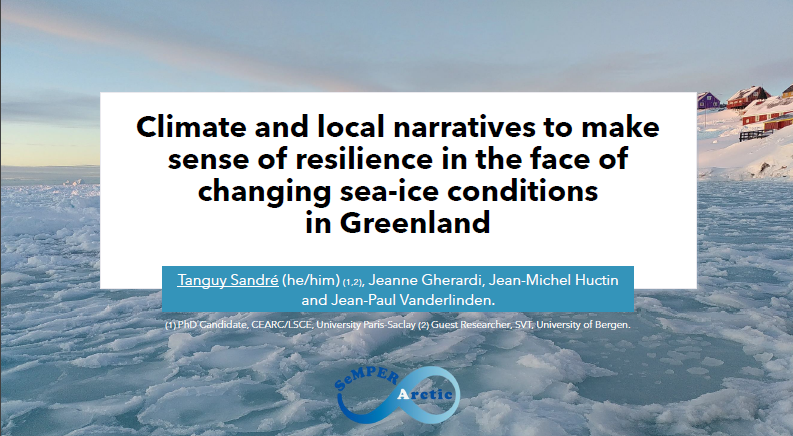
Tanguy Sandré (CEARC, France) presented his research work, within the framework of the SeMPER-Arctic project, at the "Ice in a Sustainable Society" conference organised by the International Glaciological Society (IGS) and the Basque Centre for Climate Change (BC3) in Bilbao, Spain. The main objective of the symposium was to identify the interconnections between the disciplines that deal with ice, from glaciology to anthropology, including artistic representations, in order to highlight its transdisciplinary potential. Among the keynote speakers were 1) Valérie Masson-Delmotte (LSCE), who presented the latest IPCC reports ("The Cryosphere in the IPCC Sixth Assessment Cycle"), of which she is co-chair of Working Group I, 2) Catherine Ritz, President of CNFRA, who won the 2020 Seligman Crystal Award and presented "A history of challenges and advances in ice sheet modeling" and 3) Michael Bravo (Scott Polar Research Institute, University of Cambridge), whose presentation was entitled "The Cryosphere's Shared Past: Nature and Culture".
Tanguy Sandré spoke in the session on the intersection of glaciology and social sciences to discuss the possibility of linking climate science to local narratives of change. His talk, entitled "Climate and local narratives to make sense of resilience in the face of changing sea-ice conditions in Greenland", aimed to provide an understanding of resilience in the face of changing sea-ice conditions that carefully draws on the values, knowledge, and experiences of local people. Tanguy Sandré was also invited to the panel "Moving Ice", where reflexivity on science in the making, epistemic plurality and co-production of knowledge that makes sense locally and supports local communities were crucially discussed. The panel resulted in a fruitful exchange and a strong willingness to continue its discussions in the near future.
SeMPER-Arctic project at the Arctic Frontiers in Tromø, Norway
May 2022, Tanguy Sandré
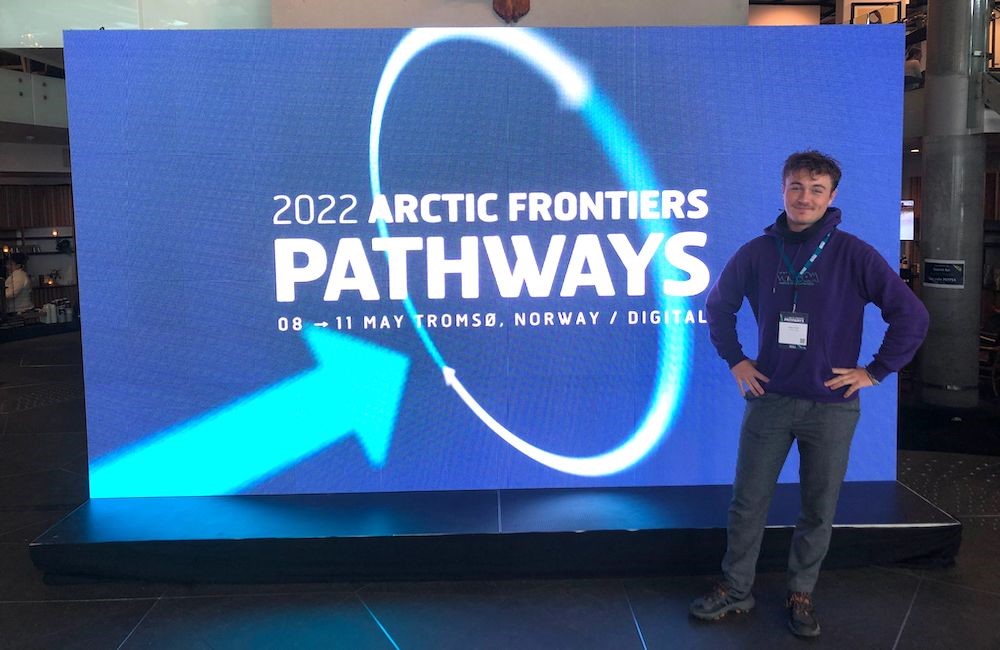
From 8 to 11 May, Arctic Frontiers brought together researchers, decision-makers and economic actors working on/in the Arctic. Tanguy Sandré, PhD Candidate at CEARC (UVSQ), was awarded a grant from the French Institute in Norway and had the opportunity to present his research work in Ittoqqortoormiit (East Greenland) in the framework of the SeMPER-Arctic project. He spoke at the session "Experiences from the science-policy interface in the Arctic", as well as at the session dedicated to poster presentations. His presentation focused on narratives of resilience and the emancipatory potential of his research.
The concept of resilience, beyond its disciplinary fluidity and a polysemic dimension, needs to be articulated with the knowledge, experiences, values and aspirations that make sense locally. Taking place in Ittoqqortoormiit (East Greenland), Uummannaq (West Greenland) and Tiksi (Siberia, Russia), the SeMPER-Arctic project argues that a narrative-centred approach, drawing on the shocks, changes and their aftermath, contains the seed of a localised definition of resilience. Nevertheless, reaching this aim requires to navigate with equanimity and reflexivity along the research process. Mobilizing a two-month ethnographic fieldwork, including notes and interviews collected in East Greenland, and a set of questions answered by the consortium members in the course of a retreat in the South of Paris, we will further explore the potential for narrative-centred approaches to foster emancipation within communities we are working with/for in the Arctic.
The article will grasp what we mean by emancipation, addressing the following questions: "emancipation to what aim, and for whom?", "who is entitled to frame emancipation?", "what practices are we performing, when we are doing research?". We will, then, argue that practising reflexivity allows for a double-emancipation process, also pursuing our own emancipation as researcher. Finally, we will describe the motion from stories to emancipation, in the context of understanding what does that mean to be resilient in the Arctic.
First IRL SeMPER-Arctic project meeting in Paris
March 2022, Anna Karlsdóttir
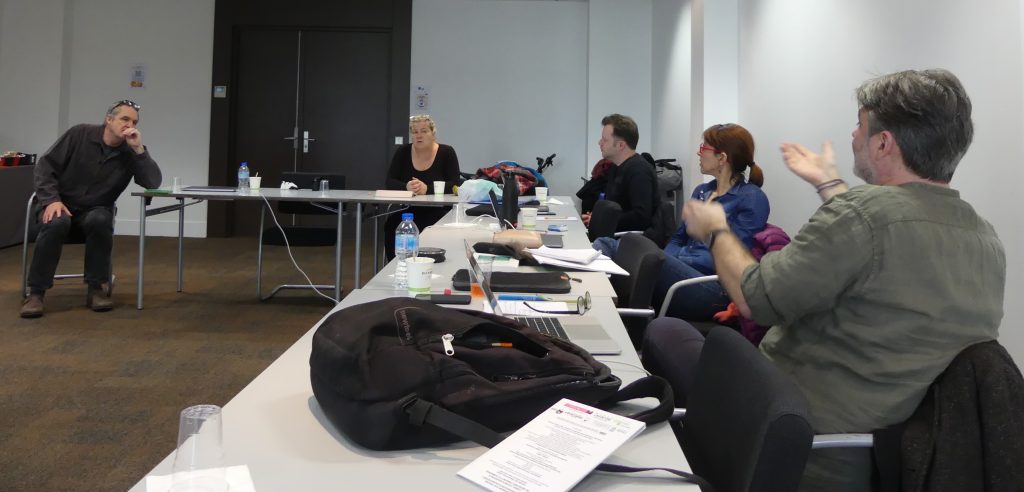
Semper Arctic project members met for the first time on location in France 7-9 March, organized at the Domaine de Saint-Paul, in the south of Paris. The discussions during the meeting were rich and it was in general a very relieved group of scholars who at last could hold a proper meeting even if hybrid to some extent (some of the partners had to take part on the distance). The Semper Arctic consortium meeting came up with a resolution, voted by all members considering a set of components important to progress the work. The nature of SeMPER Arctic´s scientific work and componed research with all its different milestones are data-intensive; there have been delays in fieldwork implementation in Greenland associated with Covid-19 pandemic, and later the omicron wave and restrictions. The meeting came up with an adaptive progress plan which deviates from the original plan but that will ensure that we fulfill the commitments in the approved proposal. The revised milestone and deliverables plan has been scheduled and listed and the coordinating party (UVSQ) with the partners will request an adequate project extension to the Belmont Forum and the national funding agency according to the resolution.
SeMPER-Arctic project was presented at the Conference in Kamchatka
December 2021, Marina Antonova
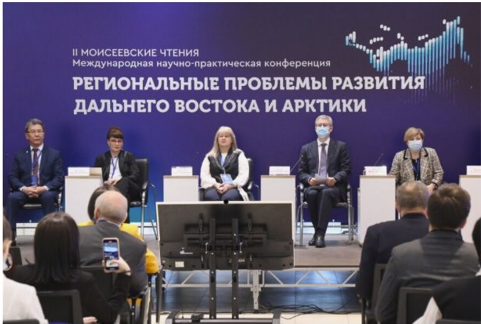
In December, 8-10 Kamchatka krai hosted an international scientific conference “Regional Challenges of the Far East and the Arctic Development”. The conference united regional politicians and researchers in three sessions, where more than 200 participants discussed challenges in economics, governance, sustainable development, and societies. The opening plenary session involved top politicians of the Russian Far East, and the exceptional researchers.
In the plenary paper presentation “Resilience of Arctic Communities: Russian Northeast Vector”, Inga Nikulkina described the preliminary results of the research of our Russian team, that is focused on the assessment of the resilience of the socio-economic system of Arctic communities in the Russian Northeast to the economic shocks.
Currently, we are exploring a hypothesis that the challenge in the resilience of the studied community is a population decrease. Such district as Bulunsky, with its economic potential and infrastructure, can be resilient with a larger population. For this, in order to comprehensively assess and identify the degree of resilience of the Arctic community under the influence of various factors, we are developing a system of econometric models. Our further analysis will develop a question: how effective is the ongoing “active” state policy and how effective are its actions?
SeMPER-Arctic in largest Arctic event in Russia
December 2021, Marina Antonova
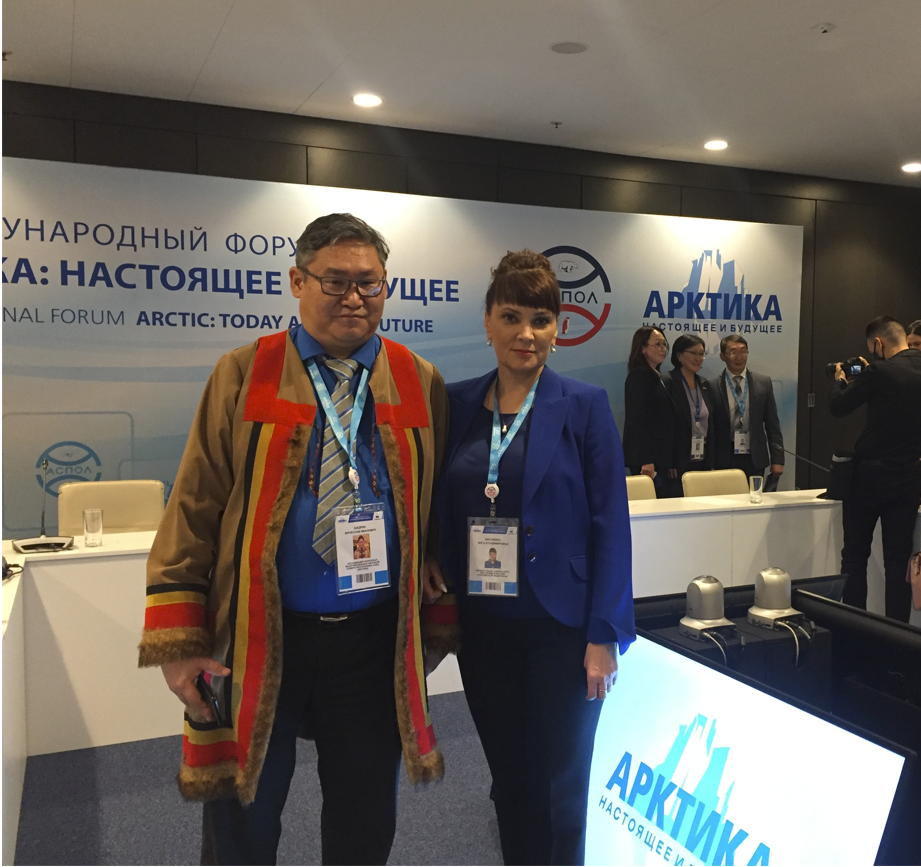
The members of SeMPER-Arctic consortium, Inga Nikulkina and Vyacheslav Shadrin, participated in the International Forum “The Arctic: Today and the Future”. It is the key Arctic event in Russia, which annually summarises the results of the Arctic agenda and unites the representatives of policy, business and society. In 2-4 December 2021 the Forum was organised for the 11th time by Russian NGO “ASPOL” (Association of Polar Explorers) in St. Petersburg. 52 discussion platforms hosted more than 400 speakers and 2500 delegates from all over Russia, who discussed the main directions for the development of the Arctic zone. As always, “the Arctic” was attended by relevant federal and regional authorities, backbone companies, technology developers and manufacturers, financial and service companies, representatives of SMEs, scientific, educational and non-governmental organizations.
Inga Nikulkina, whose research interests relay on economics and finances of the Arctic regions, shared her views and research experiences in the conference related to the Special Economic Regimes in the Arctic Russia. The discussion also touched the Russian Arctic agenda’s recently declared unprecedented economic measures for the Arctic; the common opinion stated that the Russian Western Arctic was fast to implement those measure, and the East is taking it carefully without a haste.
Naturally, our expert in indigenous and local knowledge, Vyacheslav Shadrin participated in discussions, dedicated to the issues of secure preservation of the indigenous peoples’ traditional activities and languages. The strategic session also conducted proposals for the advancement of indigenous peoples’ rights legislation in Russia.
Since our project closely works with Arctic communities, indispensably, our representatives attended the round-table on the current trends in evolution of Arctic municipalities. The session reviewed the questions essential to resilience, such as the quality of life, points of economic growth and positive transformation of municipalities, the role of extractive industries and town-forming enterprises and so on.
Russian team conducted the SeMPER-Arctic project’s fieldwork in Tiksi (Yakutia, Russia)
October 2021, Inga V. Nikulkina
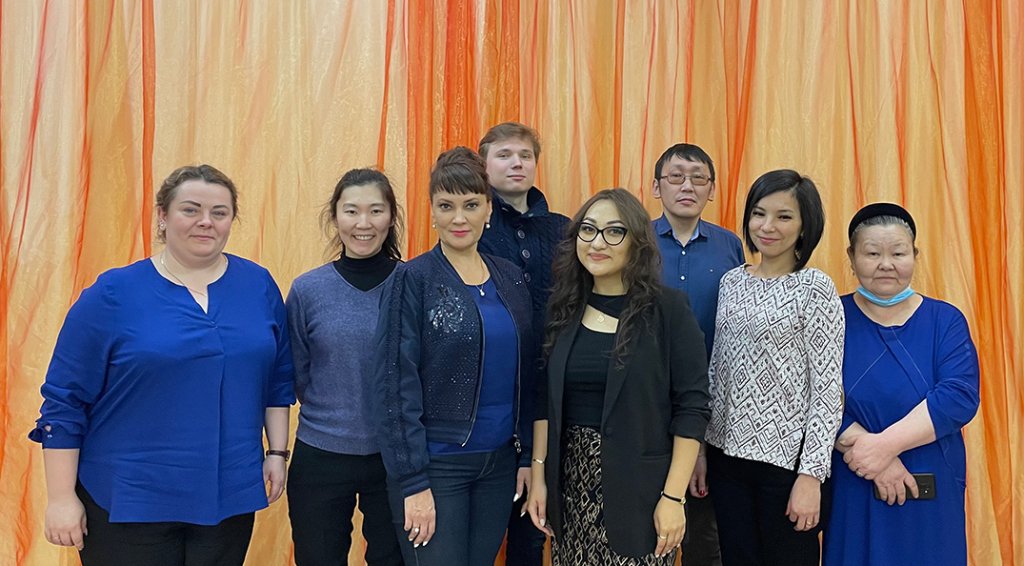
In 12-19 October, a Russian team of researchers conducted a social science expedition in Tiksi, Bulunsky district of Yakutia (Russia). The team studies resilience of Arctic communities within the international research project SeMPER-Arctic. The goal of the fieldwork was to collect data, in particular narratives, stories of shocks, upheavals in the Arctic conditions, that a community, a group or an individual had to overcome, and that changed the routine way of life. Data collection in the field is conducted to assess the resilience of Arctic communities to various shocks.
Four Russian researchers participated in the fieldwork, led by professor Inga Nikulkina. Since 2014, this was the fifth expedition of the Russian team to Tiksi. The fieldworks in Bulunsky district and Tiksi are conducted on the basis of a long-standing partnership with the Arctic community. In difficult "COVID-conditions", the group of scientists was based in Tiksi, and conducted a series of interviews with the citizens of Bulunsky district of the Republic of Sakha (Yakutia) (more than 60 people were interviewed). Also, the researchers conducted a survey on the socio-economic development of the Arctic community. They collected and processed more than 120 questionnaires.
It is important to note, that partnership with the Administration of Bulunsky district and Tiksi settlement have reached a new stage of development. The key element of the cooperation are the agreements on jointly organising an international conference in Tiksi in September 2022.
The research results of the Russian team within the SeMPER-Arctic project received the approbation of the Northern Sustainable Development Forum
September 2021, Inga V. Nikulkina
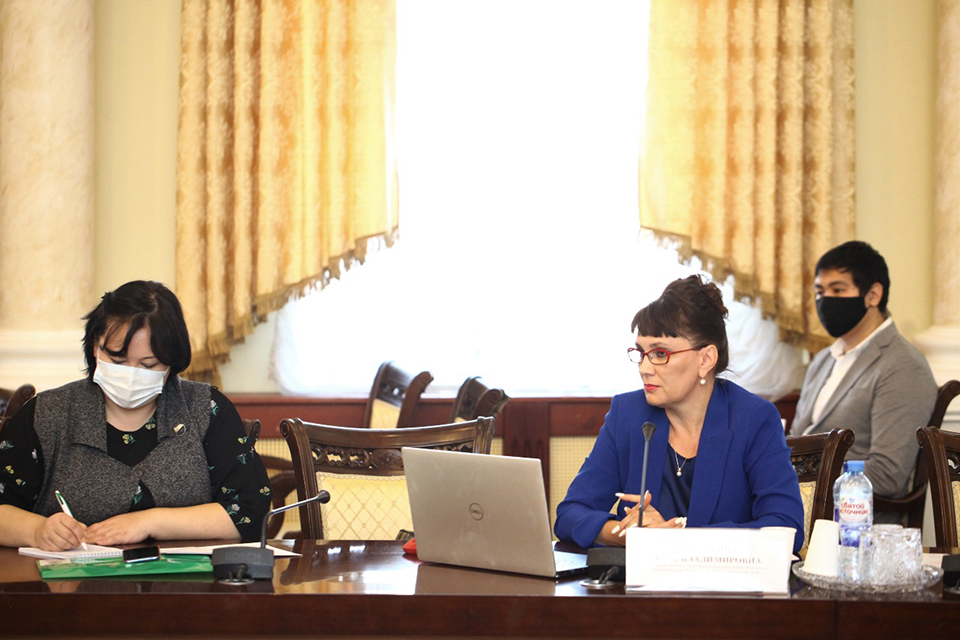
On September 27 to October 7 the city of Yakutsk (Republic of Sakha (Yakutia), Russia), hosted the 3rd Northern Sustainable Development Forum, which held over 60 events. The goal of NSDF is to organise a comprehensive discussion of the challenges and prospects of implementing the principles and goals of sustainable development in the regions of the Arctic and the North. The main theme of NSDF in 2021 is “Climate Change and Permafrost Preservation”. The organizers were the International Organization of Northern Regions The Northern Forum, the Government of the Sakha Republic (Yakutia), and M.K. Ammosov North-Eastern Federal University.
The Russian team of SeMPER-Arctic project took part in several events of the Northern Forum. In particular, researchers presented the results of their research to the experts of the Northern Forum at the VI All-Russian Research Conference "Sustainable North: Society, Economy, Ecology, Politics" on September 29. There, on the roundtable "Sustainable Development of the North in Uncertain Environment: Challenges and Responses of the Regional Policy”, professor Inga Nikulkina presented the joint international research project "Resilience of Arctic communities: specifics of implementation and prospects of development ". The conference had a number of sessions, at which all members of the SeMPER-Arctic Russian team presented:
- Inga Nikulkina and Olga Gordyachkova with a conference paper “Resilience of Arctic communities: the Russian Northeast vector” at the session “Arrangement and spatial development of socio-economic systems of the northern region: modern approaches, trends and prospects”;
- (1) Vyacheslav Shadrin on the topic “Legal enforcement to dialogue between the peoples of the North and industrial companies as a foundation for sustainable development of local communities in the Arctic”; (2) Inga Nikulkina and Egor Zolotov on the topic "Support of the self-employment as a tool for increasing the resilience of the Arctic communities: the tax aspect" at the session “Economy of mineral resource management in northern regions”;
- Tatiana Kalavriy and Elena Romanova made a presentation on "Composite indices of the population’s subjective opinion on quality of life in the Arctic Zone (in example of the Arctic Zone of the Republic of Sakha (Yakutia)" at the session "Demographic and labor potential for the development of northern and eastern regions of Russia".
Besides that, Inga Nikulkina and Vyacheslav Shadrin participated in the All-Russian Scientific and Practical Conference "Social and Economic Development of the North-East of Russia in XIX-XXI cc.: Historical Experience, Discussion, New Approaches", which was held in Yakutsk (Russia) on September 20-21. The conference was organized by the Yakutsk Research Center of the Siberian Branch of the Russian Academy of Sciences and the Institute of Humanities Research and Indigenous Studies. At this expert platform, Russian scientists presented the preliminary results of their research within the SeMPER-Arctic project.
All presented research results of SeMPER-Arctic Russian team, which were discussed and approved at the abovementioned scientific events, are planned to be published as scientific articles.
SeMPER-Arctic paper published on the framing of resilience
September 2021, Arjan Wardekker
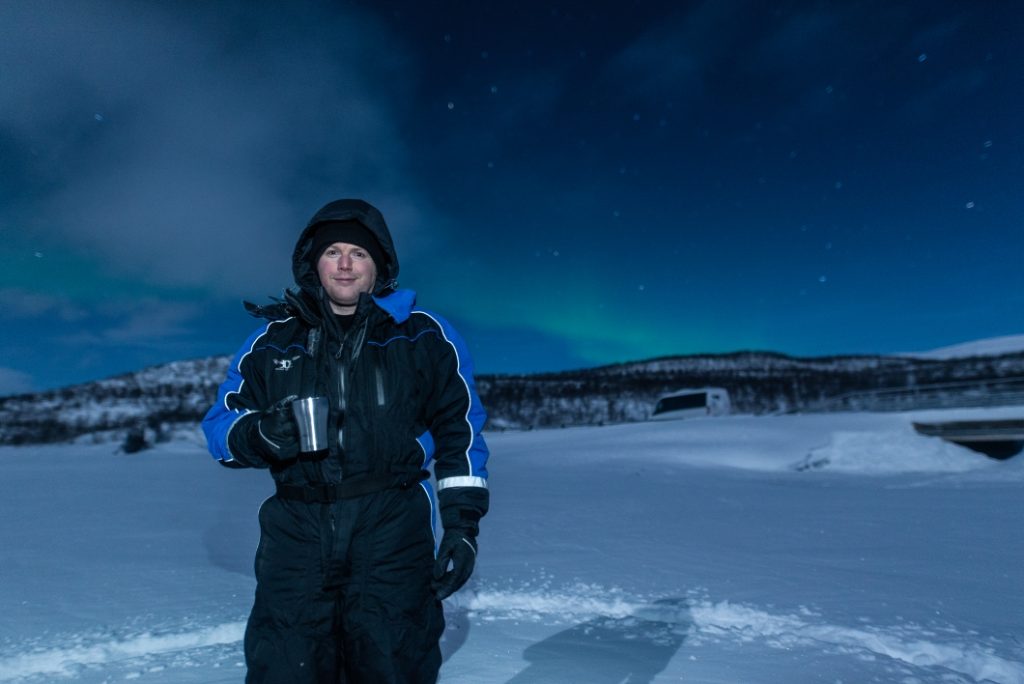
SeMPER-Arctic’s work package 5 leader Arjan Wardekker published a review of how resilience is framed in the scientific literature. Resilience is a central notion in SeMPER-Arctic, but it is interpreted in different ways. Some authors focus on short-term shocks (resilience is about quick recovery to ‘normality’ after disasters), while others emphasize long-term change (resilience is about the ability to adapt and transform, to move with the changes). Some focus on systems (resilience is about managing flows and (infra)structures) and others on communities (resilience is about individual and communal capacity-building). Framing impacts how resilience is researched, analysed/monitored in practice, and turned into policy options. Because people frame resilience in different ways, they are hyper-focused on specific problems, causes, moral dilemmas & trade-offs, and policy options – but also develop blind-spots to others.
The paper is illustrated using examples from urban and climate resilience but is based on an analysis of wider literature, such as those on disasters, ecology, climate adaptation, and planning. These same disciplines are also working on Arctic resilience, so the results will be relevant to the Arctic as well. In SeMPER-Arctic, for instance, we’re examining resilience-perspectives from climate science, anthropology, regional planning & development, and economics. SeMPER-Arctic will use the framework developed in the paper as a starting point. As a next step, we will further tailor and detail it to Arctic resilience and use it to analyse our local interview material in the Greenlandic and Russian case studies. A comparison between this framework and local and regional narratives could reveal what aspects of resilience might be important in Arctic practice and where the ‘lived realities’ of Arctic resilience might be different from how scientists currently study it.
Lecture for the 7th Korean Arctic Academy
August 2021, Anna Karlsdóttir
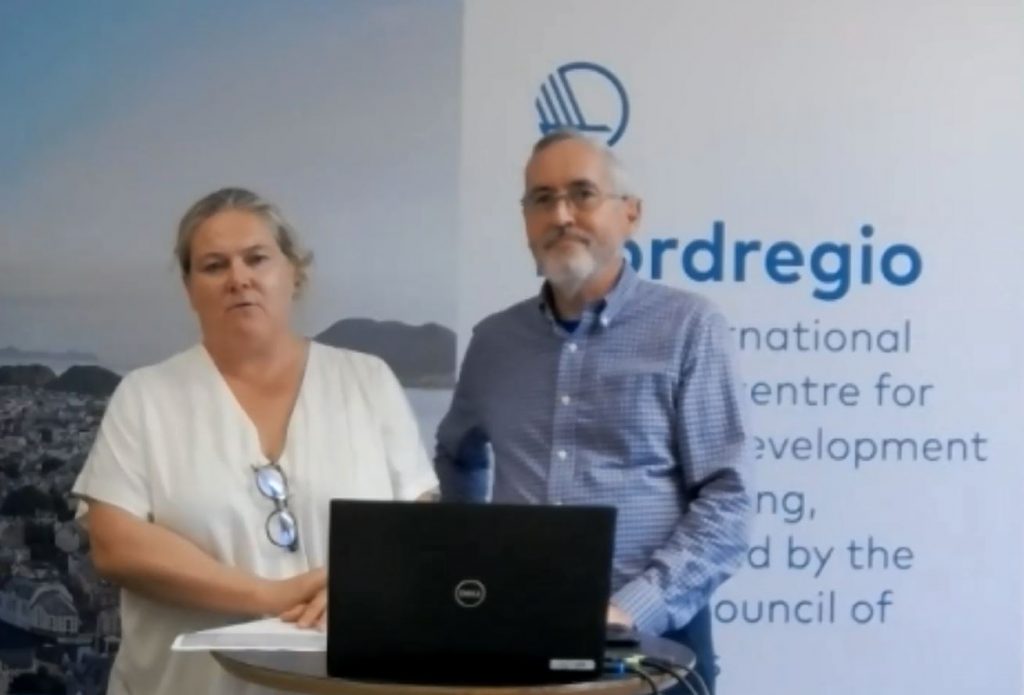
Anna Karlsdóttir, Timothy Heleniak and Marija Zelenkauskė (Nordregio) prepared and recorded a lecture for the 7th Korean Arctic Academy, organised by the Academy in collaboration with the Ministry of Oceans and Fisheries, Korea Maritime Institute and University of the Arctic (UArctic). It will be shared with 70 students and scholars from around the circumpolar Arctic on 20 August. The Academy programme contains a series of online lectures ranging from national Arctic policies, International Arctic governance, climate change and policies in the Arctic, legal issues of maritime governance to education, art and design just to mention few.
Our lecture focused on maritime communities and people in the Arctic as part of sustainable Arctic sessions. The lecture analysed population change, migration, and identity of Arctic populations. It shows the possible effects of permafrost thaw on populations and infrastructure in the Arctic. Also discussed are economic dynamics and business development, the Nordic Arctic cooperation programme, transformation, resilience and vulnerability, and the role of local decision making for change in Arctic communities, and discusses questions of inclusion of communities and people when researching the sustainability of communities in the Arctic. For us it was important to refer to the important work that is ongoing or has been conducted at Nordregio - The foresight analysis of the Nordic Arctic Working group, the Nordic Arctic Cooperation Programme, Cruise Tourism in the North, Nunataryuk, and Belmont Semper Arctic were among the projects highlighted.
The lecture was exclusively produced for the Academy. Anna has met with the programme director of the Academy at the Arctic Circle conference and as you know it is always good to extend networks. The former general secretary of the Nordic Council of Ministers said that trust is gold in the Nordic cooperation - we also mean that various relations are the gold in our work field.
The value of a narrative-centred approach for resilience in the Arctic (Conference Paper)
27 May 2021, Tanguy Sandré
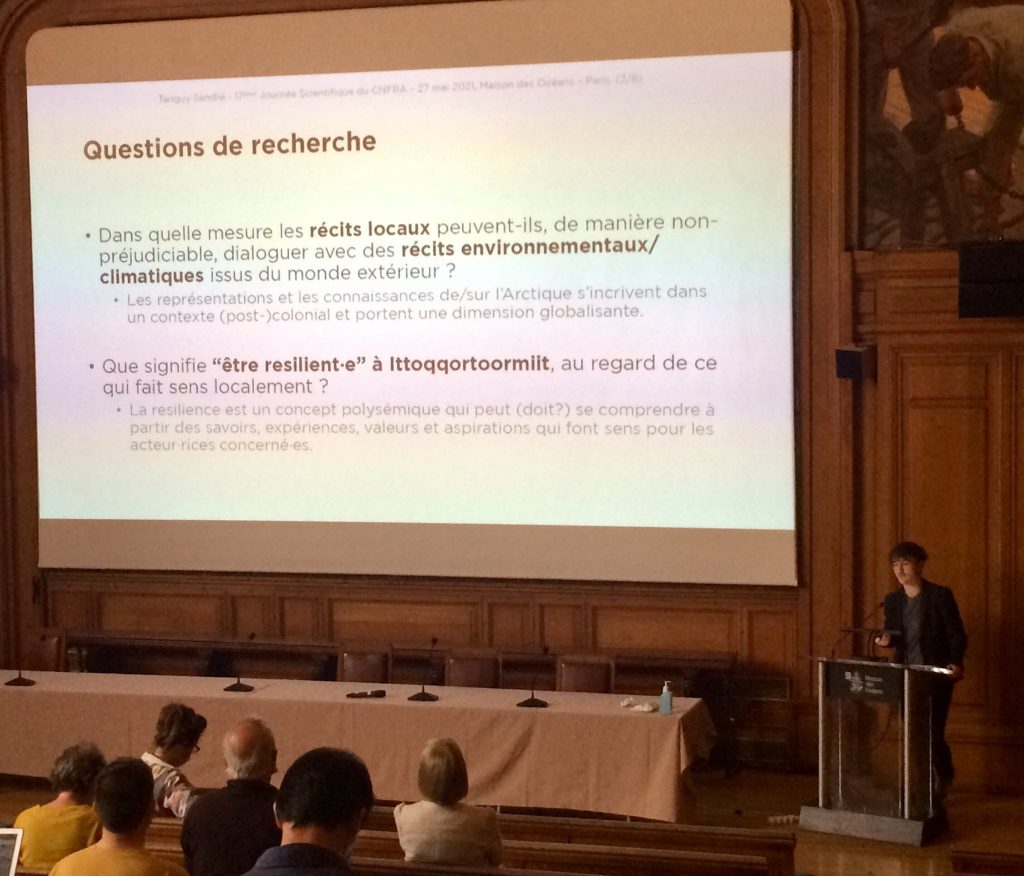
On the 27th May 2021, Tanguy Sandré took part in the Arctic panel of the interdisciplinary conference of the French Committee for Arctic and Antarctic Research (CNFRA) in Paris. The conference aimed to gather French research working in polar regions. Tanguy Sandré presented his doctoral project, carried out as part of the SeMPER-Arctic project, which focuses on understanding what it means to be resilient in the Arctic. In particular, he focused his speech on Ittoqqortoormiit, one of the three communities associated with the project. Conference paper and presentation are available online.
The concept of resilience, beyond its disciplinary fluidity and a polysemic dimension, needs to be articulated with the knowledge, experiences, values and aspirations that make sense locally. The presentation aims to argue that a narrative-centred approach allow to put the emphasis on these knowledges, experiences, values and aspirations, drawing on the shocks, changes and their aftermath that are constitutive of a localised definition of resilience. Taking place in Ittoqqortoormiit, East Greenland, the research - which is part of the SeMPER-Arctic project - aims to put these local narratives into dialogue with scientific narratives about the region. These plural narratives are not impermeable but are intertwined, competitive and/or hybridized in such a way that they affect communities agency and identity. The suggested approach simultaneously makes it possible to clarify the deployment of external concepts to improve their operational potential.
First stories collected thanks to our local partners
May 2021, Jean-Michel Huctin
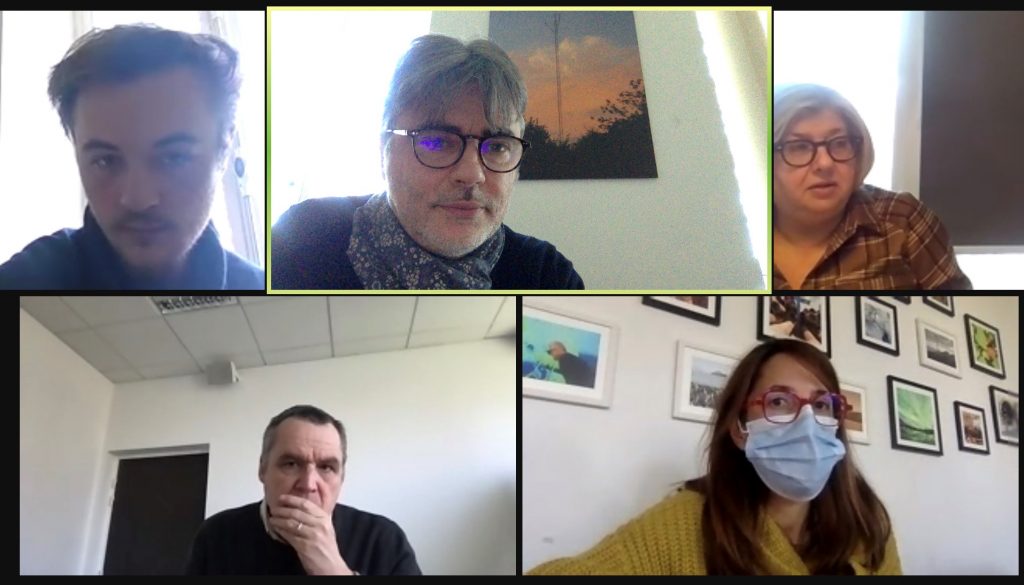
The health situation related to the COVID-19 pandemic makes it impossible to travel to Greenland, the researchers of the French team have been waiting for more than a year without being able to realize their first field trip. This is why they decided to experiment with a new way of collecting data remotely, thanks to local partners in Uummannaq and Ittoqqortoormiit. These partners have begun to conduct interviews with community members who agreed to tell the stories that have been important to them and that are of interest to the SeMPER-Arctic project. Ten interviews were collected in Uummannaq by Ann Andreasen, the director of the Uummannaq Polar Institute, with the help of Patrick Farnole, a doctoral student who has stayed there for a few months. In Ittoqortoormiit, our partner should be able to start doing this work in coordination with the researchers as soon as the interview collection procedure is well established. Regular online meetings are organized between researchers and partners on the two coasts.
Vaccination against covid-19 is underway on both the west and east coast of Greenland. As soon as it is possible to travel again without risk to local people and without a long quarantine for visitors, the researchers hope to be able to finally fly and sail to conduct fieldwork with their local partners.
An unusually bad ice season
28 April 2021, Patrick Farnole (PhD student)

In Uummannaq, the ice has been regularly blown away during the season. Consistent ice around the island started in the end of February, but did not completely reach the village of Qaarsut 20 km away, and got weakened by strong winds throughout March, then April. Fishermen went out fishing on snowmobile over the ice for a total of a few weeks only, with lots of intermissions. The "ice highways" were briefly opened from Uummannaq to the villages of Saattut and Ikerasak, with some good and bad days. I did not see any car on the ice this year. I heard that a snowmobile went through the ice - fortunately, the driver was all right. People went out dog-sledding as often as they could. While the kids of the Children's home usually spend the season out on the sea ice with the hunters, this year they were able to go out fishing and dog-sledding only a couple of times.
About hunting: only a few narwhals were caught up until December, many more after mid-January since the ice was late and breaking, leaving large open water areas. Fishing continued by boat until the end of February, although strong winds made it impossible to go out for many days. In March and early April, fishing on the ice was going on whenever possible, however dangerous. In mid April, strong winds opened the water in front of Uummannaq. Some went fishing by boat on the edge of the sea ice (a few kilometers away). Some also transported their snowmobile and dogs by boat to the ice edge, to connect Uummannaq with the village of Ikerasak.
The season is over now. The snow is rapidly melting, and Uummannaq is once again mostly rock. Today, we can see open water all around the island, with scarce ice plates at the horizon, towards the end of the fjord. Overall it seemed like an unusually poor ice season for Uummannaq, but as always, people adapt!
The importance of current local representations for shaping futures for the Arctic
3 February 2021, Anne Bremer
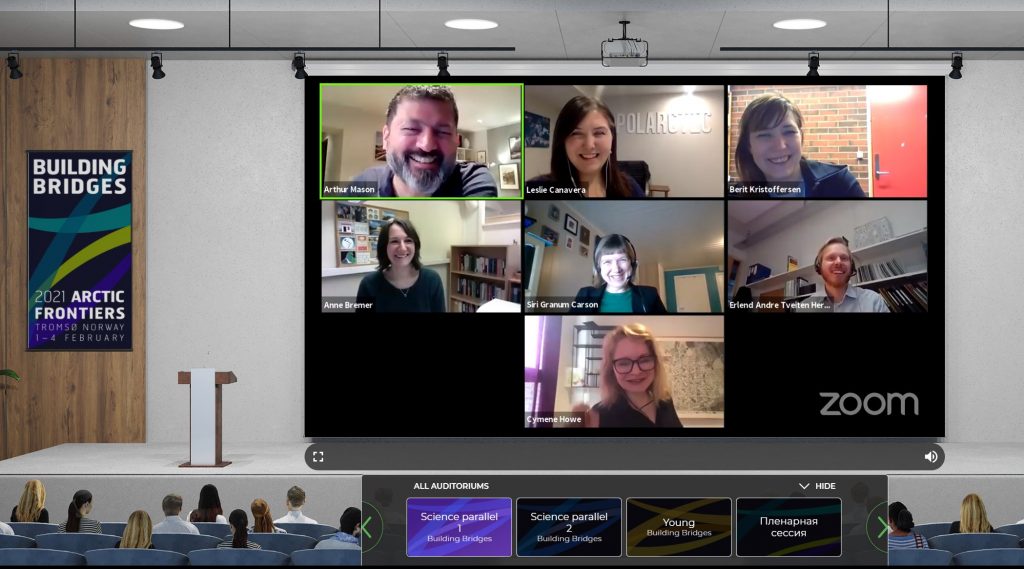
On the 3rd February 2021, Anne Bremer took part in the panel ‘valuing the digital ocean’ at the digital Arctic Frontiers conference. The panel was an opportunity to critically discuss the role of digital technologies in ‘imagining’ the Arctic, as it faces complex and far-reaching environmental, social, cultural and infrastructural changes.
Two topics came out strongly from the discussions. We first talked about the risks, uncertainties and acceptability of digital technologies like artificial intelligence to manage Arctic resources. Do local communities actually ‘need’ and/or want these technologies? What about issues of surveillance and data privacy/safety/security? And, probably the most salient open question: how do these technologies change local communities’ landscapes, identities, and capacity for resilience? We also discussed the heightened conflicts of interests around resources in the Arctic, and the extreme difficulty to balance the voices of the different actors of the Arctic (e.g., corporate groups, scientists, local communities…), as we face immense power imbalances.
In that context, Anne introduced the SeMPER-Arctic project, and how the local, narrative-based understanding of what it is to be a resilient Arctic community in the 21st century, is key for shaping future visions for the Arctic that are congruent with, and respectful of, local representations, identities and needs. In particular, the dimensions of sense-making, place attachment and extended networks, on which SeMPER-Arctic places a special attention, are essential to understanding how local communities define resilience and come to represent the Arctic in their own particular ways. These local understandings are fundamental to avoid imposing dominant western paradigms in shaping the future of the Arctic.
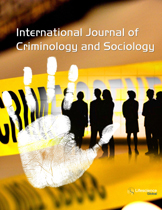
First SeMPER-Arctic paper published on Resilience of Arctic communities
31 December 2020, Tanguy Sandré
Investigating socio-economic features of settlements in the North-East of the Russian Arctic, a first scientific paper has been published by the SeMPER-Arctic consortium. This interdisciplinary paper was led by Inga V. Nikulkina, with SeMPER-Arctic colleagues Jeanne Gherardi, Arjan Wardekker and Marina E. Antonova.
This study was performed to further develop the concept of resilience and form a methodology for assessing the resilience of the economic and social system of an Arctic settlement to economic shocks. Full paper is available here.
SeMPER-Arctic student workshop in France
20 December 2020, Tanguy Sandré
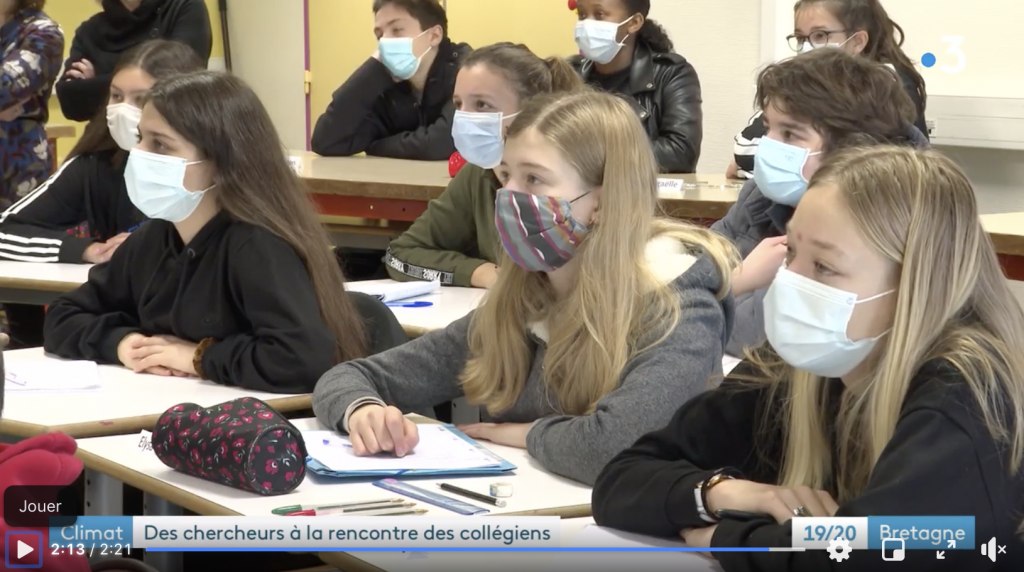
Thanks to our partner Greenlandia expedition, two SeMPER-Arctic researchers participated in a science workshop with students of the middle-school in Chartres-de-Bretagne, a city west of France. With a distant learning app, anthropologist Jean-Michel Huctin gave an overview of the Inuit world and culture, with a special focus on Greenland and the west coast community of Uummannaq where he conducted several research projects in the past years. He intends to continue his research there for SeMPER-Arctic when the pandemic risk is over.
The students were then ready to listen to environmental scientist Jean-Paul Vanderlinden who was able to join the meeting. He discussed with them the past and present impacts of climate change on people's life, especially in the East-Greenlandic town of Ittoqqortoormiit where he also plans to go back for a second SeMPER-Arctic fieldwork as soon as possible. A report on this researcher/student workshop was broadcasted by France 3, a national TV channel with regional programs. The class is expected this year to start writing to same-age students of the Ittoqqortoormiit school.
SeMPER-Arctic: First Monthly Meeting
16 December 2020, Tanguy Sandré
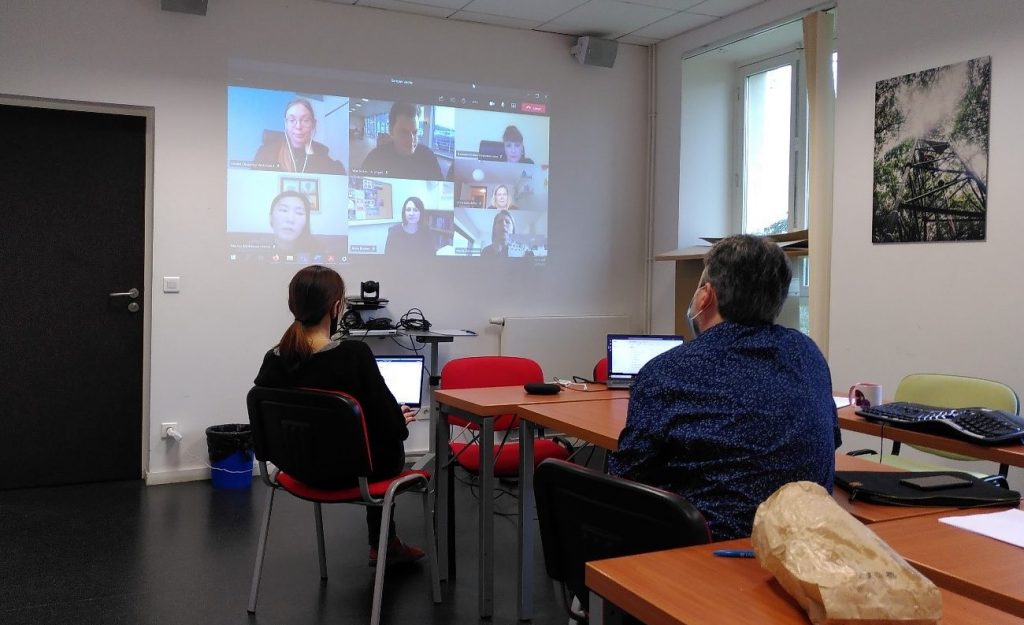
The consortium organized its first monthly meeting aiming to make an update on progresses and tame difficulties in a time pervaded of doom and gloom. While several fieldworks have been delayed from the beginning of the project, Russian partners reported on the first set of 25 interviews, conducted on a small window of lull, end October in Bykovsky and Tiksi (Republic of Sakha, Yakutia, Russia) (see the relative article). Along with this, discussions were oriented on methodological and reflexive questions that will be reckoned with the first deliverables in the coming weeks. Finally, the consortium tried to glimpse the upcoming steps; a first face-to-face workshop is expected to be hold in Paris early May.
First fieldwork for the SeMPER-Arctic consortium
26-30 October 2020, Tanguy Sandré
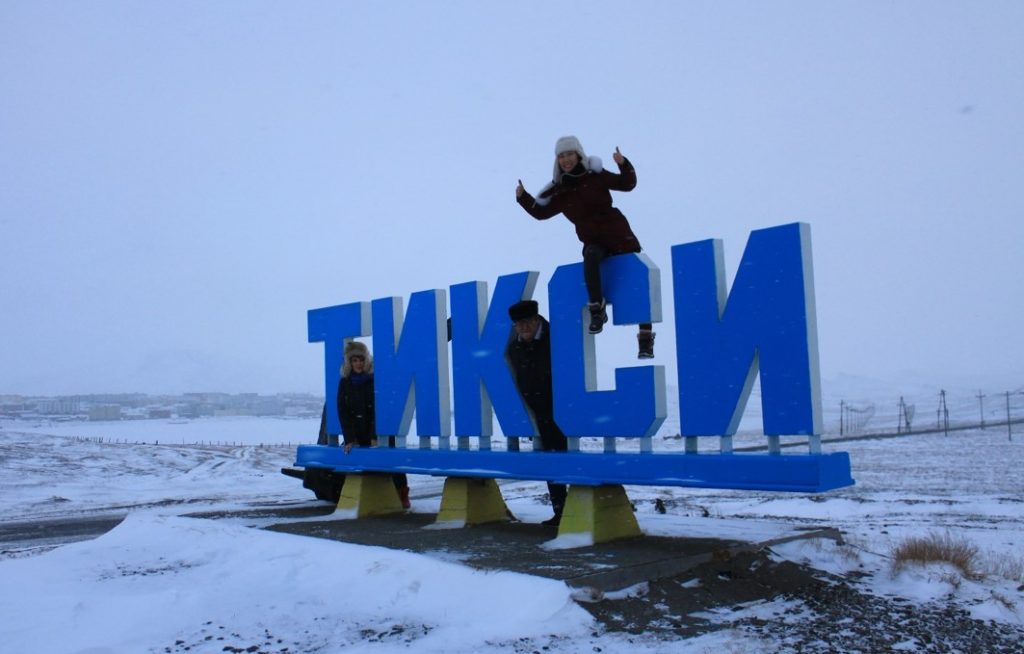
On a small window of lull, the Russian partners from the NEFU conducted the first fieldwork of the project. Conducted by Inga Nikulkina (economist), Viascheslav Shadrin (historian, anthropologist) and Marina Antonova (specialist in Arctic region, translator and interpreter) in Tiksi and Bykovsky, Bulunsky ulus, Republic of Sakha, Yakutia, Russia, the collection includes events (shocks in the framework of resilience analysis) that local communities/group of people/person had to overcome, and that changed usual life of people.
Over the fieldwork, 25 interviews have been conducted – 5 interviews were recorded in Bykovsky and 20 interviews in Tiksi. This was a crucial starting point for the interview collection package of the project as it has been a first application of the interview grid. Coming weeks will allow an in-depth analysis of the materials collected. In addition, to this impressive work, meetings have been held with officials, for instance the Head of Bulunsky district Igor Kudryashov and the Deputy Head of Bulunsky district Vladimir Miloslavsky.
Online kick-off meeting: launching of the SeMPER-Arctic project, 30 September 2020
30 September 2020, Tanguy Sandré
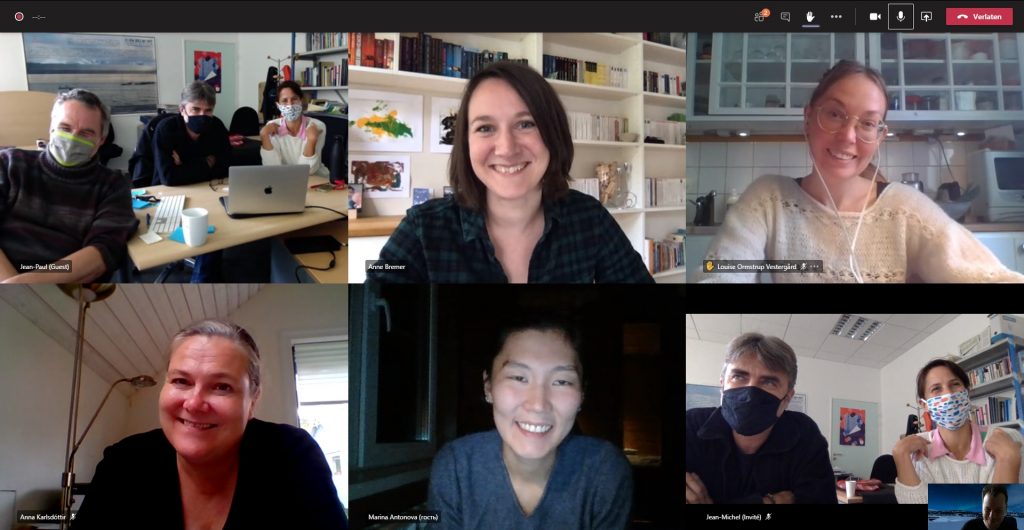
The ‘Sense-Making, Place Attachment and Extended networks as sources of Resilience in the Arctic’ (SeMPER-Arctic) project is starting up with an online workshop on narratives and Arctic community resilience. The SeMPER-Arctic team members will collect narratives among three Arctic communities – Tiksi (North Russia), Uummannaq (West Greenland) and Ittoqqortoormiit (East Greenland) – and adopt these narratives as local, and localized, anchoring devices for resilience analysis. The SeMPER-Arctic project includes institutions from five countries - France, Norway, Sweden, Russia and The Netherlands.